Humane Society International
Issue Type: Companion Animals
Humane Society International / Global
Pledge to help dogs and cats who live outdoors by offering or advocating for resources.
Humane Society International / Africa
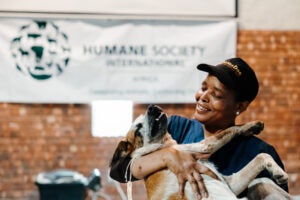
CAPE TOWN, South Africa—Animal protection organization Humane Society International/Africa has launched its Healthy Pets, Healthier Community pilot program in Struisbraai and Bredasdorp, Cape Agulhas, to improve the welfare of roaming and owned community cats and dogs. As part of the launch, HSI/Africa and partners conducted the program’s first sterilisation marathon or “sterithon” at Struisbaai North Primary School and the Bredasdorp East Sports Grounds, sterilising 142 animals (111 dogs and 31 cats) and providing vaccinations, deworming and other treatment for 100 other animals, all of whom also received other primary veterinary care and grooming—as well as treats and toys from HSI/Africa volunteers.
The Healthy Pets, Healthier Community program provides local pet owners with the knowledge to help families maintain a healthy and humane lifestyle for their pets. This pilot program is also delivering humane education for local schools and families, low-cost veterinary services, and includes an animal law enforcement component that will strengthen the protection of animals in these communities. HSI/Africa will work with partners, other animal welfare groups and school children in the communities to improve the lives of their companion animals.
The program is being rolled out following a Monitor and Impact Evaluation Assessment survey for communities, that showed low dog and cat sterilization rates in Bredasdorp East and Struisbaai North, and high euthanasia and shelter surrender rates at the Cape Agulhas Municipality animal control facility. The survey indicated that most pets are not kept inside the home or do not have suitable outdoor kennels. This resulted in cruel practices such as dogs being kept on heavy chains and pets suffering from severe untreated tick, mite, lice and fly infestations.
Audrey Delsink, wildlife director and acting campaign manager for HSI/Africa’s companion animal and engagement program, said: “HSI/Africa is very proud to launch its very first Healthy Pets, Healthier Community pilot program in Cape Agulhas. The program aims to improve the health and welfare of companion animals in these communities through enhancing the family and pet bond. This is being achieved through high sterilization and vaccination rates. Meaningful and effective community engagement and humane education will be central to the success of our program. We encourage the communities of Struisbaai North and Bredasdorp East to participate and help us implement locally humane solutions for their dogs and cats through affordable veterinary services.”
In addition, HSI/Africa also visited two local schools to teach students the importance of responsible pet care and to encourage them to bring their pets to the “sterithon” and clinic days in the areas. The talks were focused on more than 400 children, who received educational coloring books to help them learn about caring for their pets at home.
Cape Agulhas Municipality executive mayor Paul Swart said: “Roaming dogs are a real challenge in our communities. To change this situation, we need to better inform our communities and I want to commit myself to doing so, starting here with HSI/Africa. Cape Agulhas is the most Southern point in South Africa, and we want to become an example for the rest of the country. We want to be a humane society that cares for one another – not only for us as humans, but especially for our pets. Through the ’Healthy Pets, Healthier Community’ program we wish to change the mindsets of our people to help them become better parents to their pets. Healthy and happy pets can improve our personal health and bring happiness to our homes. We thank the HSI/Africa team for the work you’ve already done in Cape Agulhas, and we look forward to becoming kinder, animal-loving communities with you.”
HSI/Africa encourages all community members to register their animals for sterilization and bring their furry friends to upcoming clinics to be hosted in 2023. For enquiries about the Struisbaai North registration, call Trevor on (084) 511-8705 and for enquiries about the Bredasdorp East registration, call Kerri-Lee on (082) 712-8331. For program enquiries, call Audrey Delsink from HSI/Africa on (083) 390-0337.
For video and photos click here.
ENDS
Media contact: Leozette Roode, specialist media communications and meat reduction: LRoode@hsi.org ; 071 360 1104; E
Humane Society International / Mexico
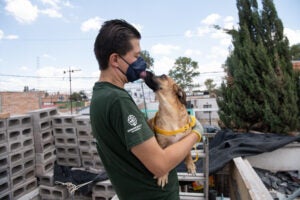
MEXICO CITY—Humane Society International/Mexico congratulated the LXIV Legislature of the Tlaxcala State Congress members for recognizing and punishing animal abuse as a crime unanimously.
Dr. Claudia Edwards, programs director for HSI/Mexico, said: “We applaud the decision of legislators to combat and punish animal cruelty—in dog fighting in particular—complying with the provisions of article 87 bis 2 of the General Law of Ecological Balance and Environmental Protection.”
This reform to the Penal Code was presented last year by congresswoman Maribel León Cruz and was supported by different animal protection organizations, including Animal Rescue-Legal Defense Tlaxcala and HSI/Mexico, and several local individuals interested in animal welfare. With this decision, Chiapas is now the only federal state without penalties for animal abuse in its state criminal code.
HSI/Mexico has worked with various civil organizations for animal protection and with authorities in various states to assist in legislation to combat and eradicate all forms of animal cruelty.
ENDS
Media contact: Magaly Garibay: 55 5407 0502; mgaribay@idee.agency
Owner Mr Hiep works with Humane Society International in Viet Nam to exit the trade and save 18 remaining dogs for adoption
Humane Society International
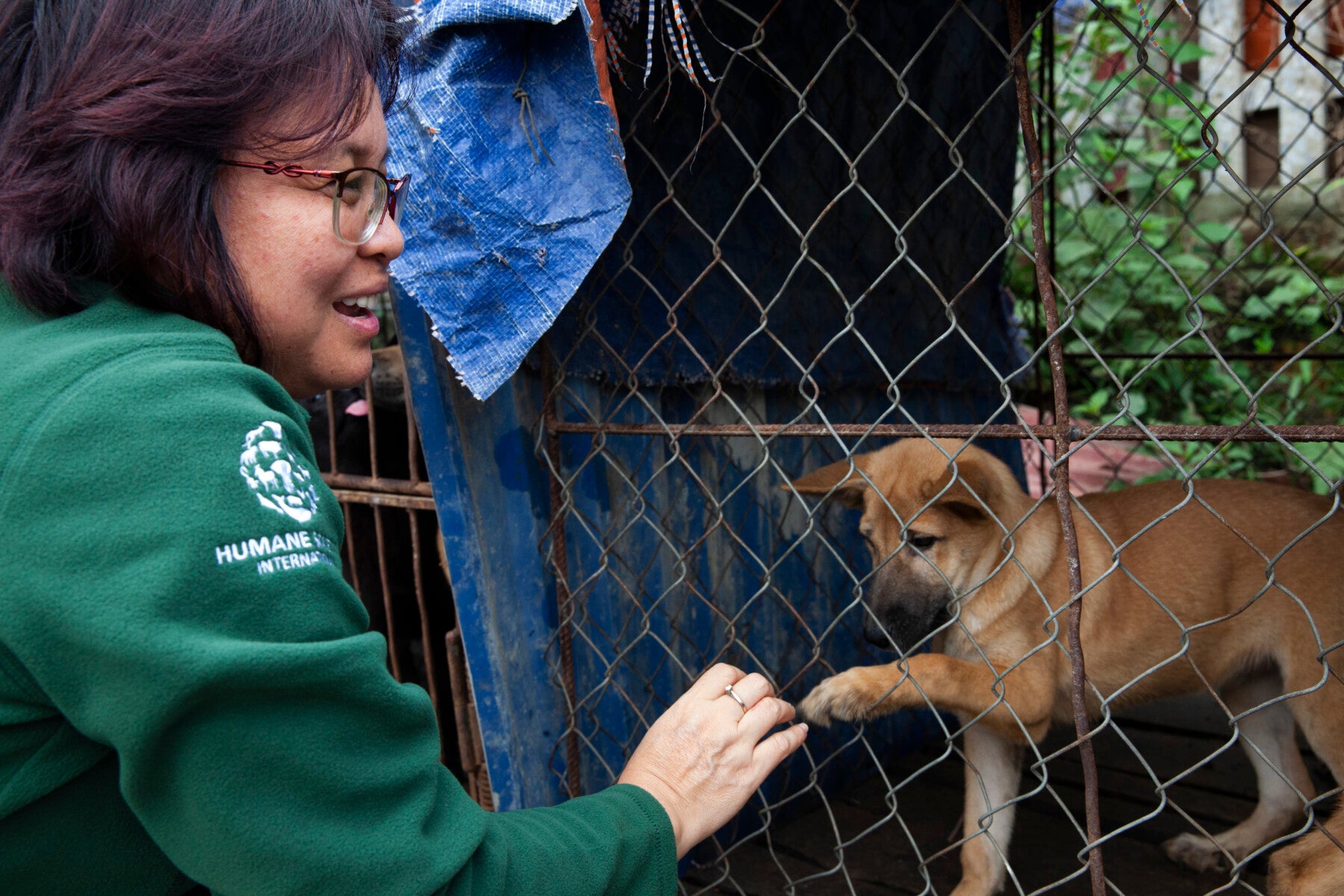
HANOI, Viet Nam—The owner of a dog slaughterhouse and dog meat restaurant in Viet Nam, which killed thousands of dogs for human consumption over the past five years, has become the first in the country to take part in a new Models for Change program by animal protection group Humane Society International. The program helps people transition out of the cruel and dangerous dog meat trade.
Forty-year-old Mr Hiep of Thai Nguyen province—a dog meat hotspot—was eager to work with HSI’s team in Viet Nam to permanently close his dog meat business and stop slaughtering dogs, because he believes killing the animals brought his family bad luck. His business was responsible for killing an average of 10-15 dogs every day. HSI and officials from the Departments of Agriculture and of Animal Health were on site to help Mr Hiep close down his slaughter operation and rescue 18 dogs found alive at the property.
HSI’s Models for Change program is coming to Viet Nam after successfully operating in South Korea since 2015, where the HSI has closed down 17 dog meat farms so far, rescuing more than 2,500 dogs and helping dog farmers transition to more sustainable livelihoods such as chili or water parsley growing.
As well as tackling the tremendous animal cruelty associated with the capture, trafficking and slaughter of an estimated five million dogs a year for human consumption across Viet Nam, HSI’s Models for Change program will also provide workers with a way out of a trade that is known to facilitate the spread of the deadly rabies virus in Viet Nam. Rabies kills more than 70 people in Viet Nam each year, according to the World Health Organization, with most cases caused by dog bites, and several verified cases linked to dog slaughter and even dog meat consumption. Last month, authorities in Hanoi reported the death of a man who contracted rabies after slaughtering dogs for meat.
Phuong Tham, Humane Society International’s country director in Viet Nam, said: “We are very proud to bring our Models for Change program to Viet Nam. The dog meat trade is not only unbelievably cruel, but also poses a very grave risk to human health from the transmission of potentially lethal diseases like rabies. Mr Hiep is the first of what we hope will be many more people to leave this dangerous trade behind them, helping the government achieve its goal of eliminating human rabies deaths from dog interactions by 2030. We recognize that many people involved in the dog meat trade are keen to leave due to low profitability, societal and family shame as well as fears of bad karma. We hope our Vietnamese Models for Change program will become a key component of Viet Nam’s strategy to provide industry workers with alternative and economically viable livelihoods, whilst also supporting the government in its efforts to eliminate rabies.”
The 18 dogs rescued, some of whom had been locked up in cages for fattening to reach slaughter weight, were vaccinated against rabies and distemper, and moved to a nearby HSI-supported, temporary care and rehabilitation facility at the Thai Nguyen University of Agriculture and Forestry, to receive necessary medical care before being considered for local and international adoption. Mr Hiep plans to transform his business to sell agricultural services such as crop fertilizer, as well as groceries, green tea, beer and snacks to waiting customers.
Mr Hiep said: “I know in my heart that killing and eating dogs is wrong, and it was becoming harder and harder for me to do it. I am convinced that being part of this trade was bringing my family bad karma, so I am relieved to work with HSI in Viet Nam to end this chapter in my life and start afresh. The risk of spreading rabies through the dog meat trade is something we should all take very seriously, so I feel proud to be standing up for change in my community, and happy to know that the dogs who have been saved will be able to live new lives with families. It’s a good outcome for me, the dogs and my community.”
HSI conducted research in Thai Nguyen and Hanoi to establish that Viet Nam’s dog meat trade is largely supplied through snatching dogs from the streets or stealing pets from private homes. Traders frequently use poison bait such as meatballs laced with cyanide, and catch the dogs using painful taser guns and pincers. Pet theft and the arrest of pet thieves is frequently reported in the Vietnamese media, and devastated pet owners often buy back their beloved companions if they are fortunate enough to locate them after capture. Traders also go village to village by motorbike to purchase dogs from rural communities that occasionally sell “excess” dogs for extra income. Once there is a sufficient number of dogs to fill a truck, they are tightly packed into small cages and driven for hours or even days, many sustaining injuries as well as enduring exhaustion, dehydration, suffocation, heatstroke and even death before the truck reaches its final destination – a slaughterhouse, market or restaurant.
The link between rabies transmission and the dog meat trade has been well established by the World Health Organization, and the virus’s elimination is undermined by continued dog meat trade activities. Studies by the National Institute of Hygiene and Epidemiology demonstrate that a significant percentage of patients in Viet Nam who become infected with the virus after contact with dogs, do so not due to a bite but after killing, butchering or eating dogs. The link between rabies and the dog meat trade is so well established that in 2018 and 2019, authorities in major cities such as Hanoi and Ho Chi Minh City urged citizens not to consume dog meat to reduce the risk of disease transmission.
Dr. Phan Thi Hong Phuc, dean of animal science and veterinary faculty at Thai Nguyen University of Agriculture and Forestry, said: “Rabies is endemic in Viet Nam, and the dog meat trade is a contributing factor to the spread of this virus to humans. So, we are very pleased to work with HSI in Viet Nam on Models For Change, a first-of-its kind program for our country demonstrating how dog meat trade workers can transition to better, safer livelihoods.”
Dog meat facts:
- Viet Nam kills more dogs for meat than any other country in Southeast Asia.
- While the sale and consumption of dog meat is not illegal in Viet Nam, the unregulated trans-provincial movement of dogs has been illegal since 2009, and pet theft was made a punishable offence in 2016. While several cities including Hanoi and Hoi An have pledged to end the trade, enforcement of laws is rare and trucks continue to openly transport hundreds of dogs at a time on national highways.
- Unlike most other countries across Asia where the majority of citizens don’t eat dog meat, in Viet Nam dog meat —known as thịt chó— remains more popular, and is the go-to dish for special occasions. One recent study of dog meat consumption found that 11% of people in Hanoi and 1.5% of people in Ho Chi Minh City, regularly consume dog meat (at least once/month on average).
- A belief by some consumers persists—despite no scientific evidence—that dog meat has medicinal properties and can increase male virility.
- Dogs are usually killed with a knife to the jugular and heart, in full view of other dogs.
- A 2016-2017 study of dog brain samples from Hanoi slaughterhouses commissioned by Asia Canine Protection Alliance (of which HSI is a member) in partnership with Viet Nam’s National Center for Veterinary Diagnosis showed that one in every 100 dogs had been infected with rabies, which is a high incidence rate.
- Academic papers published in 2008 and 2011 are among those that establish the connection between the dog meat trade and rabies. Detailed references are available upon request.
Download video and photos of the dog slaughterhouse closure operation.
ENDS
Media contact: Wendy Higgins, director of international media: whiggins@hsi.org
Humane Society International / Global
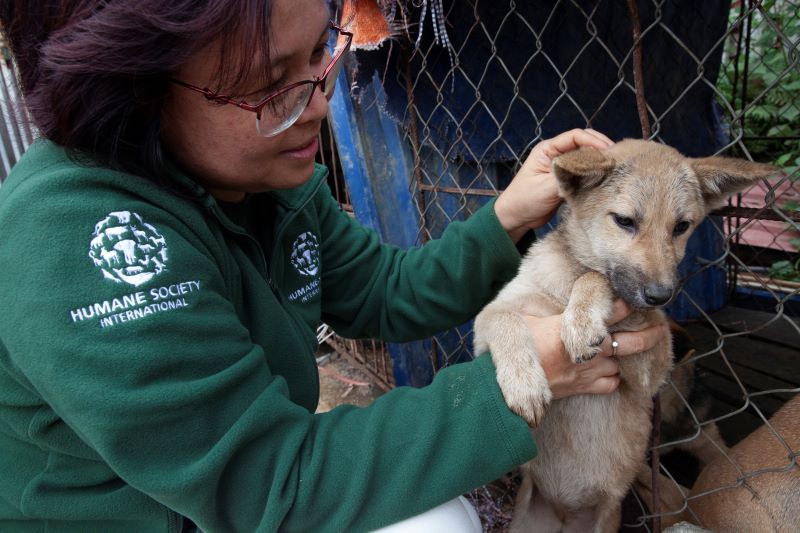
The dog and cat meat trade in Viet Nam
Every year in Vietnam, an estimated five million dogs and one million cats are captured, stolen, trafficked and brutally slaughtered for their meat. This trade is not only marked by extreme animal cruelty but also involves significant criminal activity. To capture dogs, traders often resort to using poisoned bait tasers, and iron pincers, while cats are trapped using spring-loaded snares. Pets are frequently stolen from homes, and animals are trafficked across borders from neighboring countries such as Laos, Cambodia and China.
During transport, the animals are crammed into small cages and loaded onto trucks for grueling journeys that can last several days. Throughout this ordeal, they are deprived of food, water and rest, leading to some dying from suffocation, dehydration and heatstroke before reaching their final destination—a restaurant, market or slaughterhouse where they are killed and sold on as dog or cat meat.
Threat of rabies
The dog meat trade is not only inhumane but also poses significant public health risks, especially concerning the spread of rabies. Vietnam continues to see approximately 70 human deaths each year from rabies, with most cases linked to dog bites. The trade in dogs of unknown disease or vaccination status undermines anti-rabies efforts and endangers everyone involved.
Growing local opposition to the trade
Viet Nam is somewhat unique in Asia regarding the relatively widespread consumption of dog and cat meat. Unlike most countries on the continent, where such practices are limited to a small minority, a recent Nielsen poll from September 2023 commissioned by HSI revealed that nearly 40% of the Vietnamese population consumes dog meat, while 21% eat cat meat. Dog meat is particularly popular among men in northern Viet Nam, while cat meat dishes are especially common in Hanoi and the northern province of Thai Binh.
Despite this, there is growing local opposition to these trades, especially among young people and pet owners. Nationally, 64% of people support a ban on dog meat consumption, and 68% support banning the dog meat trade. Similarly, 71% of the population favors a ban on both the consumption and trade of cat meat. The primary reasons for this opposition are a strong aversion to the cruelty involved and the belief that dogs and cats are companion animals, not food. This sentiment is likely driven by the increasing number of pet owners in Viet Nam; 87% of poll respondents reported having directly or indirectly experienced the theft of a pet for the trade.
Our work in Viet Nam
HSI is dedicated to tackling the dog and cat meat trade in Viet Nam by advocating for stronger laws and regulations that prohibit these practices on the grounds of animal welfare, public health and safety and stopping illegal cross border movement of animals.
We aim to raise awareness among both the government and the public about the inherent cruelty, the illegal nature of the trade, the emotional toll on pet owners and the significant public health risks linked to rabies. By amplifying the voices of Viet Nam’s growing community of pet owners and animal lovers, we seek to influence policymakers in favor of reform while also working to reduce demand for dog and cat meat. Our goal is to secure a nationwide ban on the slaughter and consumption of dogs and cats in Viet Nam.
As part of our program in Viet Nam we are collaborating with the authorities in two target provinces, Thai Nguyen and Dong Nai, to launch initiatives aimed at reducing the dog and cat meat trade and dog and cat meat consumption in each province. This involves enforcing existing laws, such as health and safety regulations, environmental regulations and animal welfare laws to restrict the trade and training local law enforcement agencies to combat it effectively. Additionally, we deliver community initiatives in these provinces that raise awareness of the risks of the dog and cat meat trade, encourage responsible pet ownership, support pet sterilization and increase canine rabies vaccination coverage.
Additionally, after years of success with our Models for Change program in South Korea, we launched this initiative in Viet Nam in 2022. While most animals for the trade are either stray animals caught from the streets or stolen pets, some dogs and cats are farmed for the meat trade. These farms are not farms in the traditional sense but are rather facilities where young dogs and cats, often unwanted litters, are sold by their owners into the trade, where they are fattened on farms and then slaughtered. We are working directly with farmers who want to leave this cruel trade behind and transition to alternative humane livelihoods. Our Models for Change program not only enables workers to leave the trade but also allows for the rescue of dogs and cats who are voluntarily handed over to HSI as part of the closure, ending their suffering and the suffering of dogs and cats who would have been slaughtered in the future. The dogs and cats we rescue from the meat trade receive veterinary care and rehabilitation at our partner shelter facilities. Once restored to full health, these animals are available for local adoption, enabling them to find safe and loving homes.
Humane Society International
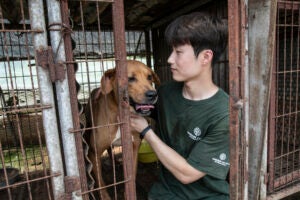
WASHINGTON—This week, 34 dogs are arriving at Washington Dulles International Airport from South Korea where they were rescued from the dog meat industry by Humane Society International/Korea and its partners. Romeo, Nuri, Daisy, Phoenix, Brown Bear and the other dogs coming to the U.S. will be cared for at a care and rehabilitation center operated by HSI and the Humane Society of the United States. They will receive the love and comfort that the dog meat industry denied them, including beds, a nutritious diet, enrichment and veterinary care. Eventually they will be transferred to the HSUS’s shelter and rescue partners where they will be ready for adoption into loving homes.
Up to an estimated 1 million dogs a year are killed for meat in South Korea, intensively bred on farms where they are locked in barren, metal cages without water or proper food, living in squalid conditions, many suffering from malnutrition and painful skin and eye diseases. Most are brutally slaughtered at around one year of age, usually by electrocution.
Sangkyung Lee, dog meat campaigner for Humane Society International/Korea, said: “For these dogs flying to the United States, South Korea’s dog meat industry will soon be a distant memory. But hundreds of thousands of other dogs are still languishing in terrible conditions on dog meat farms for a meat that very few Koreans want to eat and most want banned. It’s now been one year since the South Korean government acknowledged the need for a dog meat task force, and we are still no closer to ending this cruel industry. The time for delay is over. We are urging relevant government ministries to proactively work towards ensuring the task force delivers a plan to end the suffering of all dogs living miserable lives on dog meat farms.”
Jeffrey Flocken, president of Humane Society International, said: “As a proud parent of a dog rescued in 2019 from the 15th farm Humane Society International helped transition out of dog meat industry, I know these dogs can become wonderful additions to a family. All these nearly three dozen dogs needed was the chance to be saved from the dog meat industry, and that was made possible by HSI’s fantastic teams and partners on-the-ground in South Korea and here in the United States.”
Kitty Block, president and CEO of the Humane Society of the United States and CEO of Humane Society International, said: “It is a testament to the professionalism and
effectiveness of our staff and animal advocate partners in South Korea that local authorities there are working more frequently with us to help coordinate care for dogs saved from the meat trade. As these rescued dogs arrive in the United States and move into our rehabilitation center, we look forward to the next chapter: preparing them to be adopted into loving homes where they can finally enjoy life as all dogs should.”
As these dogs start new lives, Humane Society International will continue to campaign for an end to the dog meat industry. Since 2015, HSI/Korea’s Models for Change program has helped dog farmers in South Korea transition to new, more humane and profitable livelihoods such as chili plant and parsley growing or water truck delivery. HSI/Korea has permanently closed 17 dog meat farms and rescued more than 2,500 dogs who find adoptive homes in the United States, Canada and the United Kingdom, with a small number rehomed in South Korea.
An opinion survey by Nielsen Korea published and commissioned by HSI/Korea in October this year, shows that 85% of Koreans say they have never eaten dog meat or will not do so in the future. In addition, 56% of people said they support a dog meat ban.
54% of Koreans in their 20s who ate dog meat, did so reluctantly under pressure from fathers and senior work colleagues
Humane Society International
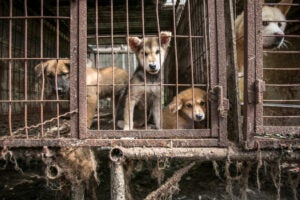
SEOUL, South Korea—More than half of South Koreans in their 20s who have consumed dog meat in the past year, felt social pressure to do so from influential seniors such as their father or senior colleagues at work, a new survey finds. While the majority of respondents in this age group did not consume dog meat, of those who did, 54% reported that they ate dog meat under pressure, rising to 57.4% in urban areas. Despite this, the survey found that nationwide refusal to eat dog meat is very high, with 87.5% of people saying they have never eaten it or will not do so in future and 56% supporting a ban.
Animal protection group Humane Society International/Korea which commissioned market research experts Nielson Korea to conduct the survey of 1,500 people from urban and rural areas, says young Koreans instinctively feel that eating dogs is wrong and they should feel empowered to say no in social situations. HSI/Korea says that pressure to eat dog meat from family or work seniors, means that more people—particularly in urban areas—are eating dog meat than actually want to, and the percentage of dog meat eaters would be considerably lower if more people felt free to exercise their individual choice.
Sangkyung Lee, Humane Society International/ Korea’s dog meat campaign manager, said: “Although it is clear that the vast majority of South Koreans don’t and won’t eat dog meat, it is nonetheless concerning that so many young Koreans feel pressured to eat it even though they don’t want to. The data shows that people in their 20s are more supportive of a dog meat ban than other age groups, and are more concerned about animal suffering and the lack of hygiene. Despite those concerns, more than half of respondents in this age group who did eat dog meat in the past year, say they felt pressured to do so. Pressuring people to eat dog meat needs to become socially unacceptable, and young Koreans like myself need to feel empowered to say no and stick to our principles. It’s ironic that while an individual’s right to choose is the top reason put forward by those who oppose a dog meat ban, our survey suggests that if social pressure were removed, even more people would exercise that choice by not eating dog meat at all.”
The main findings of the survey are that:
- 87.5% nationwide say they have not or will not consume dog meat in the future.
- 53.6% of Koreans in their 20s who ate dog meat in the past year, did so despite not wanting to.
- 29.2% nationwide were first introduced to dog meat by their father and 22% by their office senior.
- 63.7% nationwide say they are concerned about the welfare of dogs raised for meat.
- 53.1% nationwide believe dog meat is not safe and hygienic to consume.
- 56% nationwide support a dog meat ban.
- 64.1% of respondents nationwide who oppose a dog meat ban do so because they believe it should be an individual’s choice.
Earlier this month (Oct 7) at the National Assembly, Democratic Party Assembly member Jeoung-ae Han expressed her frustration that the Ministry of Food and Drug Safety isn’t doing enough to tackle the illegal and unhygienic dog meat industry. Han said: “According to the Food Sanitation Act, dog meat is not considered food therefore it is clear that dog meat trade is illegal. The current law states that the Ministry can crack down on dog slaughter, and dog meat processing, distribution and cooking because it is illegal. However, the Ministry does not do its work.” She went on to say, “it is threatening people’s health to turn a blind eye to unhygienically processed dog meat.”
A government taskforce was announced in November last year and established in December, to evaluate options for a dog meat ban. Despite surveys showing that the majority of Koreans would support a ban, the task force has twice delayed publishing its conclusions and has now been silent since June this year. HSI/Korea says the time for delay is over and urges President Yoon to help South Korea end the dog meat era forever.
JungAh Chae, executive director of HSI/Korea says: “The taskforce was originally set up because it was recognized that the time is right to ban dog meat. However, almost a year later, the taskforce has still not advanced any recommendations for how to implement a dog meat ban despite that outcome clearly being favoured by most Koreans. President Yoon is a dog owner himself, including of a rescued Jindo, a breed we typically find suffering on dog meat farms. We urge him to help make all Jindos just as lucky by ending South Korea’s dog meat era once and for all. By doing so we would join with others across Asia such as Hong Kong, Taiwan, Singapore and Thailand in consigning dog meat to the history books.”
Since 2015, HSI/Korea’s Models for Change program has helped dog farmers in South Korea transition to new, more humane and profitable livelihoods such as chili plant and parsley growing or water truck delivery. HSI/Korea has permanently closed 17 dog meat farms and rescued more than 2,500 dogs who find adoptive homes in the United States, Canada and the United Kingdom, with a small number rehomed in South Korea.
Download photos and video of an HSI/Korea dog meat farm rescue.
ENDS
Media contact: Wendy Higgins, director of international media: whiggins@hsi.org
Notes: The survey of 1,500 people from urban and rural areas was conducted online in August 2022 with a margin of error of +-2.53%.
Humane Society International / United Kingdom
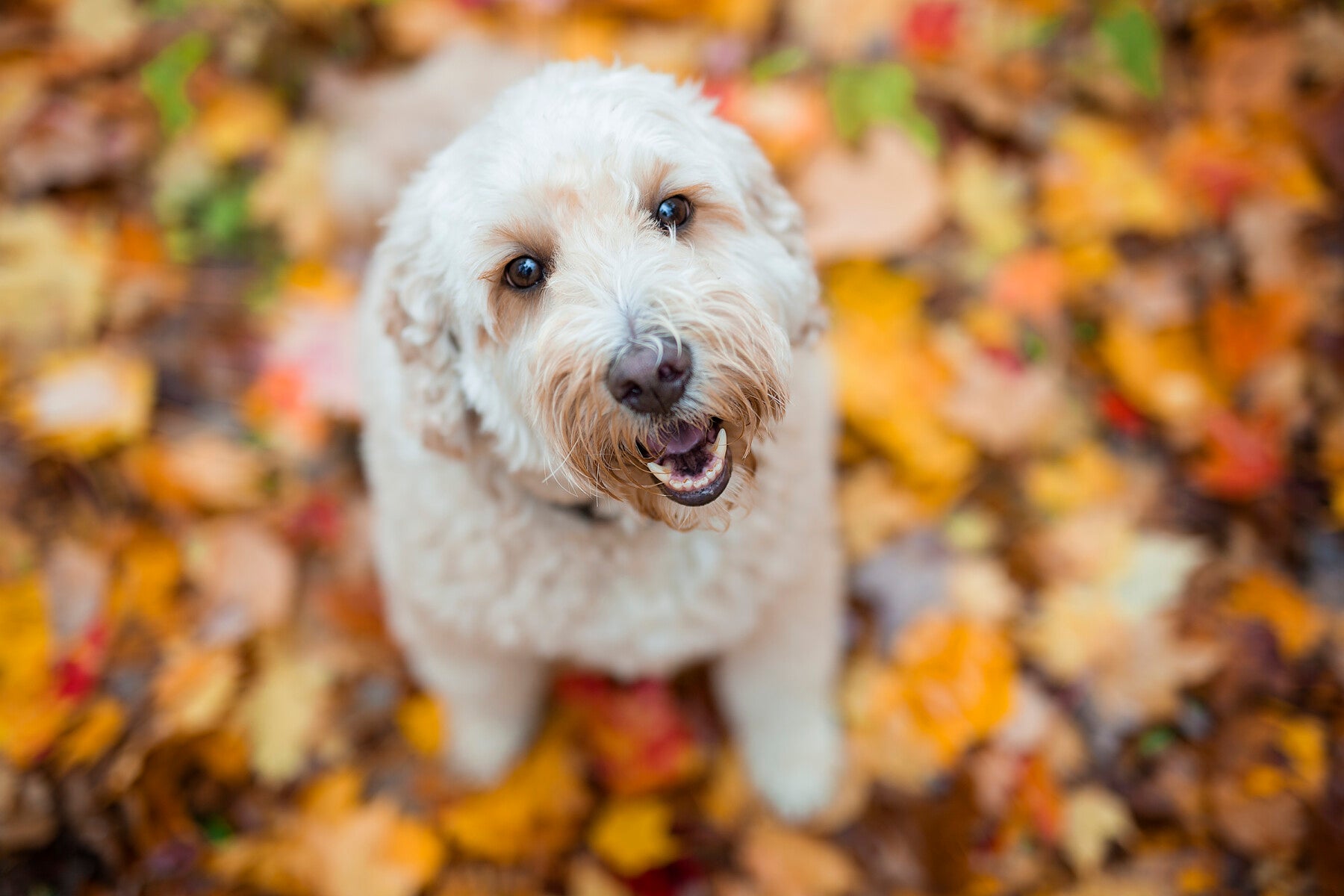
Fireworks can be fun for some, but terrifying and dangerous for others. Here is our advice for keeping companion animals and wildlife calm and safe during Bonfire Night and other festivities often celebrated with firework displays, such as Diwali and New Year’s Eve.
Fireworks might bring some colour to dark winter nights, but they can pose a real danger to animals. Both domestic and wild animals can find the thunderous sounds and flashing lights overwhelming and terrifying.
Pets may be so scared of fireworks that they shake in fear or become extremely agitated. Some get so frightened by the noise that they run away from otherwise familiar environments, and can even get injured or lost. Others become so stressed that they sadly suffer devastating or even fatal health effects.
And it’s not only dogs and cats who we need to think about—wildlife is affected, too. The sudden bright flashes and sounds can disturb wild animals and cause them to run into roads, resulting in traffic accidents. Birds can get disorientated by the loud explosions, with research showing that fireworks can cause flocks of birds to take off for prolonged periods of time, expending crucial energy, and even fly so far out to sea that they are too exhausted to make the return flight. Additionally the debris from fireworks, containing toxic materials, can be mistakenly consumed by wildlife or even fed to their young.
Here are our top tips to keep animals safe when there are fireworks, from Bonfire Night to beyond:
Fireworks advice for dogs and cats
- Walk dogs before dark, when it’s much less likely fireworks will be set off. It’s a good idea to keep them on-lead around dates such as Bonfire Night just in case.
- Keep pets safely indoors with you, making sure the windows and doors of your house are securely shut. Block any exits that animals could escape through, such as cat flaps. At the same time, ensure that your cat or dog has access to safe hiding space in your home if they want to, such as under a table.
- As well as closing windows, draw your curtains or blinds to reduce the lights and noise coming in from outside.
- Background noise can help to mask the sound of fireworks. Keep the TV on or try some calm music.
- Just like at all other times, dogs and cats should be wearing a collar and identification tag—even when they’re safely indoors. Some pets can become so scared during firework displays that they may take desperate measures to escape the noise, running outside when doors are briefly opened or even breaking through windows. You should also make sure your pet is microchipped and that the contact information on the chip is up to date.
- If needed, speak to your vet about medications that might help to reduce your pets’ anxiety. Calming jackets for cats and dogs, which provide a gentle pressure to alleviate stress, are also available.
Fireworks advice for small mammals such as rabbits and guinea pigs
- Bring any outdoor hutches inside for nights when fireworks are happening in your areas, and keep them in a quiet room with the windows and curtains shut.
- Provide extra bedding for pets to burrow in, to help them feel safe and secure.
Keeping wildlife and other animals safe on Bonfire Night
- Care should be taken not to let off fireworks near farmed animals or horses, as this may cause them to panic.
- If you have horses, check if there’s going to be any firework displays in your area and get in contact with the organisers to ask if they can set off the fireworks well away from where horses are kept, or to consider using low noise fireworks. Stay with your horse if you think fireworks are going to be let off nearby, and talk to your vet for advice in advance.
- Carefully check bonfires for wild animals such as hedgehogs before lighting them.
Take action to reduce the bangs
We agree with the RSPCA that tighter regulations are needed to restrict firework use, in order to reduce the number of bangs and unpredictability of when they occur. The Scottish government has already brought in extra controls and we urge other UK governments to follow their lead by:
- Introducing a licensing scheme for the purchase of fireworks, which would reduce sales and ensure that people buying and using fireworks are appropriately trained, preventing injuries to both people and animals.
- Shortening the period in which fireworks can be legally sold around Bonfire night. At present they can be sold from mid-October to mid-November, meaning weeks of unpredictably timed private displays. We’d like to see the sale window shortened to only one week before Bonfire night, similar to the shorter sale windows for New Year’s Eve and Diwali.
- The current legal noise limit for fireworks sold to the public is 120 decibels, a similar level to a plane taking off! We’d like to see this reduced to 90 dB.
You can show your support for tighter controls on fireworks by:
- Contacting your MP to let them know you are concerned about the animal welfare impacts of overly liberal firework laws, and signing government e-petitions to help get the issue debated in Parliament.
- Asking your local officials to use low noise fireworks for public displays, or even to try out a different type of celebration. Light displays using drones or lasers are a more eco-friendly alternative to fireworks.
Chinese police intercept 1,408 pet and stray dogs and cats in appalling conditions
Humane Society International / Global
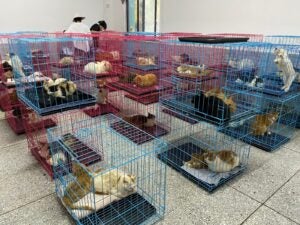
BEIJING—Chinese animal activists have released shocking footage of dead and dying dogs and cats on a truck crammed with 1,408 animals being trafficked for the meat trade in China. Three hundred and seventy dogs and cats perished on board, or shortly after removal from, what activists are calling the “death truck” which was stopped by police on the highway headed for slaughterhouses and markets in Yulin, in south China. The footage was released to global animal protection group Humane Society International which campaigns across Asia to end the dog and cat meat trades.
The truck was intercepted in Xian Tao city in central China’s Hubei province, half way along its intended 1,200km journey from Fucheng in the north to Yulin in the south. Rescuers from local animal groups converged at the scene, joined by Beijing-based dog meat campaign specialists from Capital Animal Welfare Association who were able to carefully unload the traumatised animals. Alongside the lifeless bodies of dead dogs and cats, they found animals suffering with open wounds, broken bones, respiratory disease and severe dehydration. The activists administered what emergency treatment they could on the roadside, temporarily transporting the dogs to a nearby school and the cats to a holding facility before local shelters could rally to collect them.
CAWA’s Hao Da-yue attended the scene and estimates that most of the 718 dogs were likely stolen pets, and the 690 cats were probably snatched from the streets. The surviving animals are now being cared for by staff at local shelters who are administering life-saving treatment. They fear that the animals have endured such an ordeal, more may yet succumb to their injuries and sickness. HSI is providing emergency funds to help some of the shelters caring for the animals.
Hao Da-yue said: “I’ve attended many rescues of dogs and cats from the meat trade, but never before have I encountered such a shocking scene. This was a death truck, crammed full with desperate, frightened, traumatized animals caged up with their dead and dying companions. The smell of death, diarrhoea and vomit was overwhelming, and the sound of the animals whimpering and crying for our attention, was just heartbreaking. I saw a number of dogs and cats die on the roadside despite desperate attempts to help them, there was nothing that could be done but hold them as they passed away. Activists worked with tears in their eyes, many clearly shocked by what they were witnessing. The world needs to see how these poor dogs and cats suffer for China’s meat trade. Such appalling cruelty brings shame on China and shame on the majority of Chinese people who want nothing to do with this despicable trade.”
Although China has no animal protection laws with which to prosecute the traders for cruelty, Chinese health and safety regulations do present an opportunity. The two truck drivers have been detained by police and reported to Xian Tao officials, and the trader who contracted them and accumulated the animals now faces investigation by the Agriculture Bureau and could face charges for transporting sick animals across provincial boundaries without legally-required quarantine papers.
Dr. Peter Li, Humane Society International’s China policy specialist, said: “I want to pay tribute to the dedication and bravery of Chinese animal activists who work so hard to help animals caught up in the dog and cat meat trades. Having been to dog and cat slaughterhouses and meat markets myself, I know first-hand how traumatising it is to see this scale of animal abuse, and yet they are committed to exposing this cruelty in the hope of ending the trade for good. It is a tragedy that so many of these poor animals died on this truck, and the suffering they all endured at the hands of the meat traders is unimaginable. Most people in China don’t support this trade and it doesn’t reflect modern Chinese society, but without robust animal protection laws in place, we will continue to see this terrible cruelty.”
Facts:
- The truck was intercepted by police on 1st October 2022.
- Most people in China don’t eat dogs and cats. In fact they are only eaten infrequently by a small percentage of the Chinese population. Even so, it is estimated that as many as four million cats a year could be killed for the meat trade.
- In 2020, two major cities in mainland China–Shenzhen and Zhuhai–banned the consumption of dog and cat meat, a decision polling of 378 million people in mainland China by news site com shows is supported by nearly 75% of Chinese citizens.
- In addition to Shenzhen and Zhuhai in mainland China, across Asia the trade in and slaughter, sale and consumption of dogs is banned or otherwise ended in Taiwan, Hong Kong, the Philippines, Thailand, Singapore, Siem Reap in Cambodia, and 19 jurisdictions across Indonesia. In South Korea a government-initiated task force is currently considering the issue of a ban. President Yoon Suk-yeol has stated he would not oppose a dog meat ban provided there is social consensus, and first lady Kim Keon-hee has spoken publicly of her desire for an end to dog meat consumption.
ENDS
Media contact: Wendy Higgins, Humane Society International director of international media: whiggins@hsi.org
